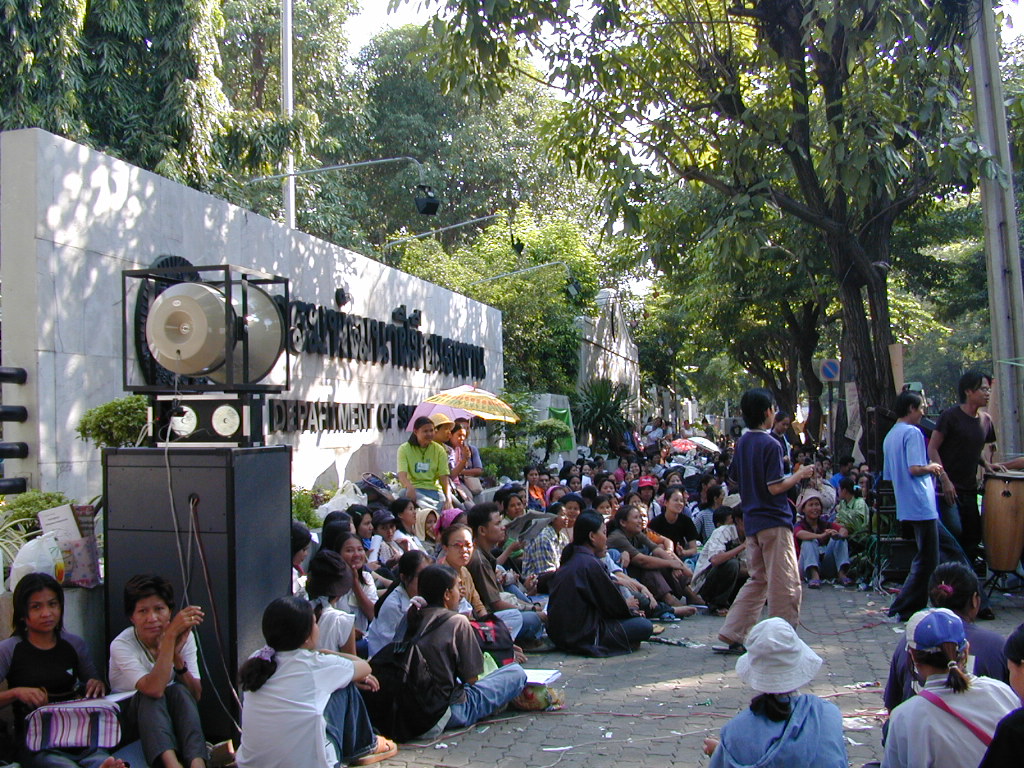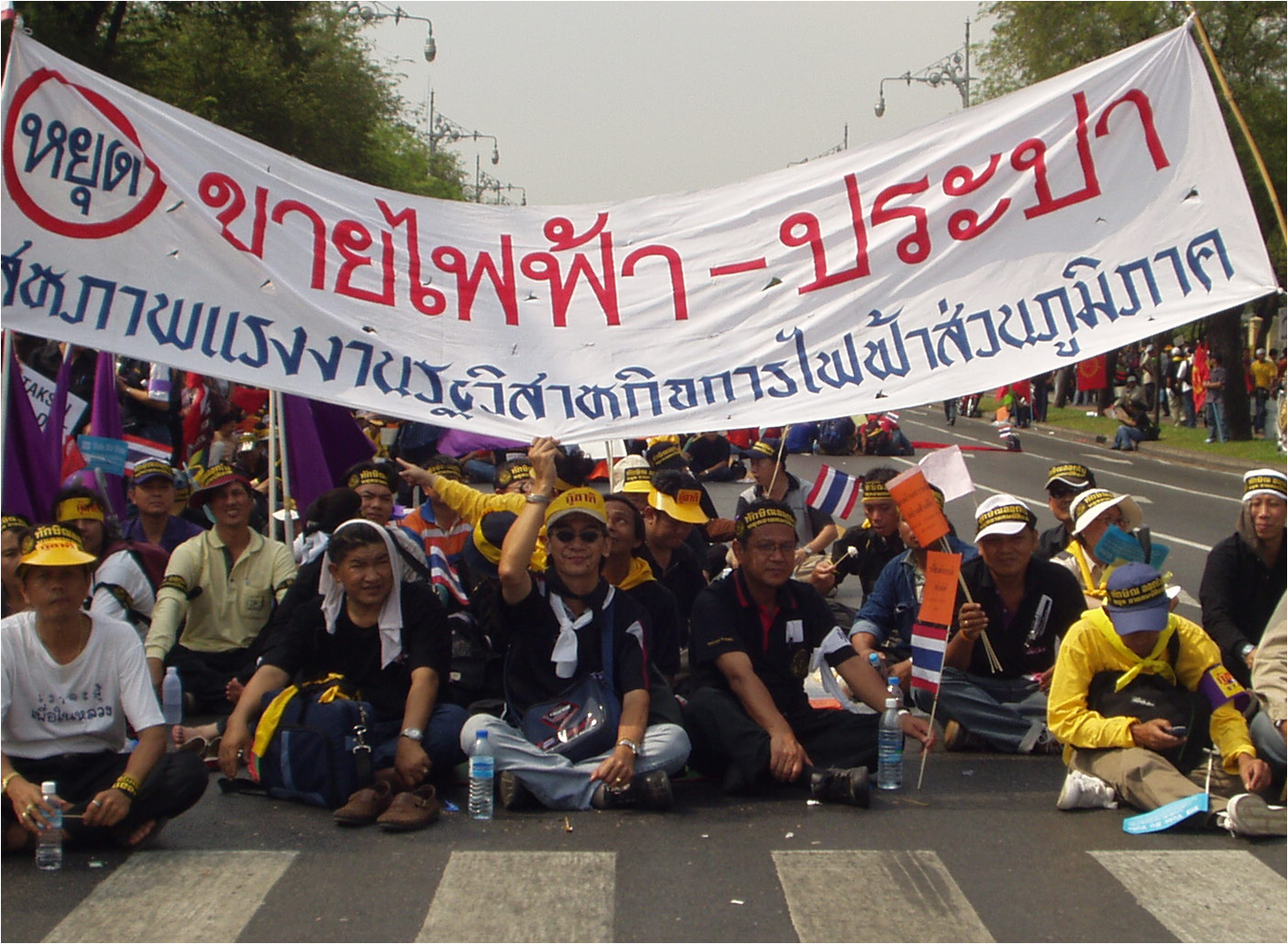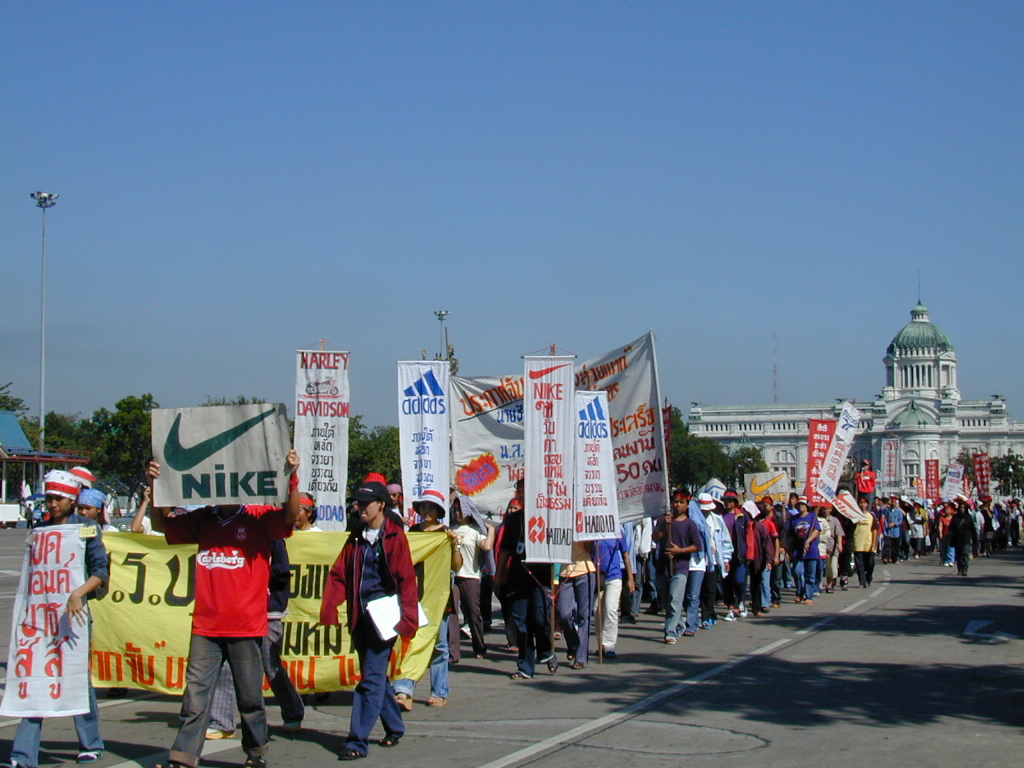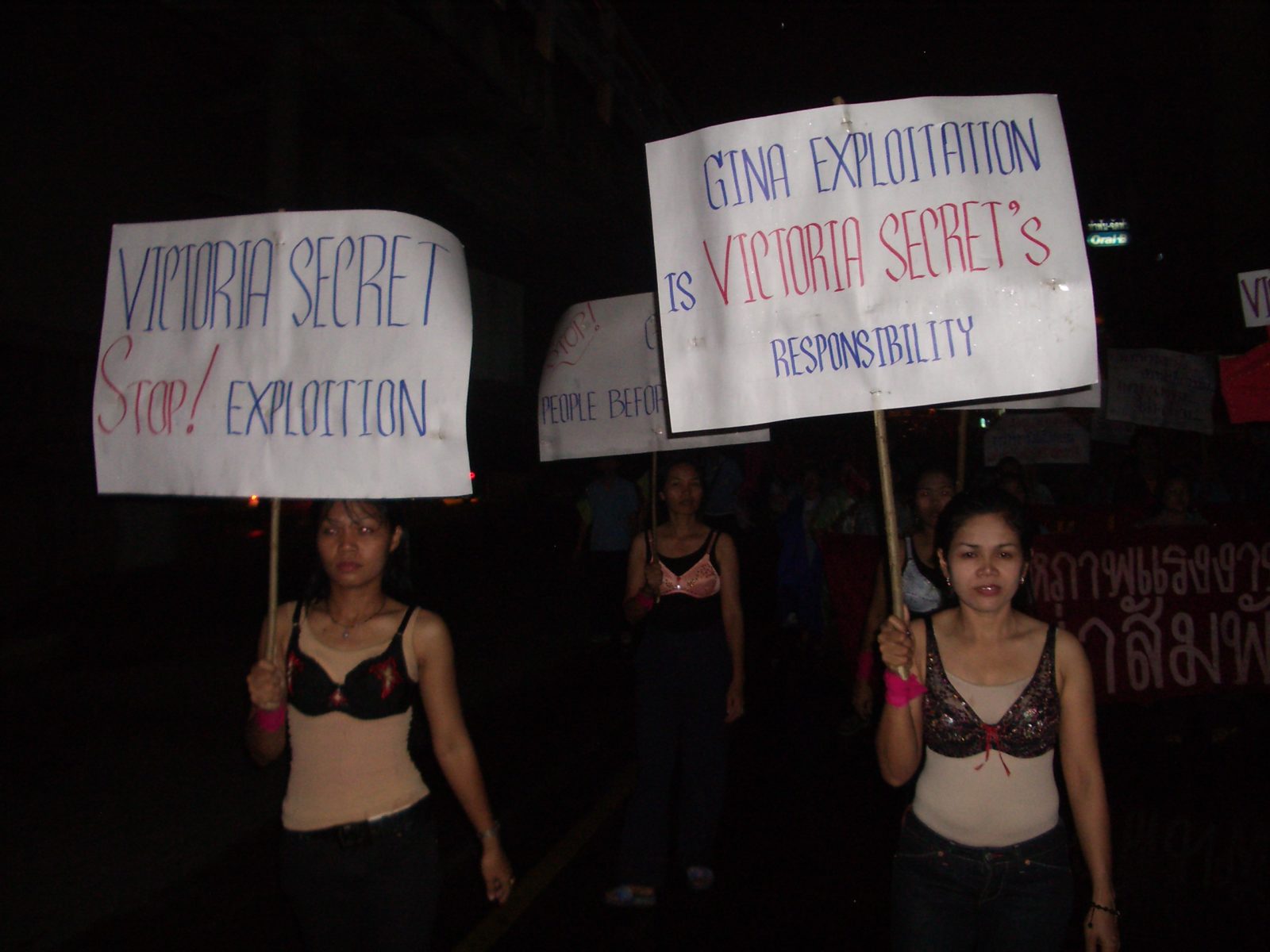“The Coups and The Thai Labour Movement”
First publish in German language at website: https://suedostasien.net/ Ende der Gewerkschaftsbewegung,

Bed and Bath workers protest against their mass layoff, Oct. 10, 2002 © Junya Yimprasert
Thailand: Militärputsche sind in der Regel schlechte Neuigkeiten für die Arbeiter*innenbewegung. Warum unterstützen die thailändischen Gewerkschaften dennoch die jüngsten Putsche des Militärs?
I have written many articles on the issue of labour. Most of those that were written right after the burst of the economic crisis in 1997 dealt mainly with urgent problems such as unfair layoffs, safety in the workplaces, negotiating fair wage and welfare. Nevertheless, when I look back reflectively, I found that there are still lots of other aspects need to be studied and written, especially the questions of what precluded the development of the Thai labour movement. Regarding the latter, I would like to propose that military interferences and, in particular, the 5 coups d’état are, perhaps, the most important reasons. Since these are very big and complex issues, therefore, what I am trying to do here is to present preliminary snapshots of how Thai labour and their movements were undermined by the 5 military coups, from 1957, 1971, 1991 to the two recent ones in 2006 and 2014.

Unionists protest against privatization of state-owned companies at an anti-Thaksin demonstration. A wing of the unions supports the monarchy and the military, 2006 © Oliver Pye
Three first coups: 1957, 1971 and 1991
In the early 1950s, the International Labour Organization (ILO) sent experts to study the living standard and working conditions of Thai labour. Their report revealed several severe problems — for example, very young child labour, illiteracy, women in physically hard labour, lacking of skilled workers, unhygienic drinking and toilet facility, and the impotent of Thai trade unions. This report was officially presented to the Thai government in 1954, and then, along with the pressure pushed by ILO as I believe, it later led to the issuing of the Thai Labour Act in 1956, in the late of the second Field Marshal Plaek Pibulsonggram administration.
This act, nonetheless, stayed only for just two years because the 1957 coup, led by Field Marshal Sarit Thanarat, issued an Order No. 19/1958 to revoke it. The reasons why they had to repeal the labour act was written clearly in the Order No.19. The order stated that
“… as the Thai Labour Act 1956 has inappropriate statutes. It opens up possibilities to be abused as an instigating tool to cause the disunion between the employers and workers, and damage the sympathy and compromise between the two parties. There is also a chance for the Communist agents to manipulate this law for their wrongful instigation of the workers.”
But even so, the military regime could not deny the fact that Thailand in the transitional period from subsistence agriculture production to a commercial one and also industrial production really kept creating a huge amount of cases of labour conflicts. Thus, although Thailand was ruled without the constitution and any labour laws from 1958 to 1969, the junta legislated the Settlement of Labour Dispute Act in 1965.
In 1971, the new junta regime, led by Prime Minister Field Marshal Thanom Kittikachorn, that came from the coup against its own government in the same year, repealed the 1965 labour dispute act and issued instead the Order No. 103/1972. This order covered general aspects of labour protection, for examples, from wage to social security and compensation. It could be argued that this order is a prototype of the Social Security Act (1990) and also the Labour Protection Act (1998)
In 1991, the coup led by Gen.Sunthorn Kongsompong, father of the current Commander in Chief of the Royal Thai Army (Gen.Apirat Kongsompong), had a clear aim to bring down the Thai trade unions which were getting stronger at that time. The junta issued the Order No. 54/1987 and 56/1987 to dissolve the state enterprise trade unions and to prohibit the outsiders to get involved (help organizing) in any general trade unions.
The plot twisted: 2006 and 2014 coups
However, the Thai trade unions and the two last coups, in 2006 and 2014, became the plot twisted tales and also, at the same time, the awkward predicament of the international trade union movements. From the key progressive force in the series of mass protests which put an end to the Suchinda junta regime in 1992, Thai trade unions turned 180 degrees back to support two anti-elected-government movements that pave the way to two coups in 2006 and 2014.
This is definitely not an irresponsible accusation at all. Those who follow Thai politics with an open mind will see clearly how much the image and reputation of Thai trade unions were harmed and tainted from their stubbornly attempt to overthrow four people-elected governments (Thaksin 2006, Samak 2008, Somchai 2009, and Yingluck 2014).

Bed and Bath workers march in front of the U.S. Embassy, Dec. 2002 © Junya Yimprasert
The alliance of Thai trade unions in that period was led by Somsak Kosaisuk from the State Railway Worker Union Of Thailand (SRUT), Sirichai Mai-gnam from the Provincial Electricity Authority State Enterprise Employees’ Association (PEASEA), and other leaders from the State Enterprise Workers Relations Confederation (SERC). On 9 February 2006, these unions officially announced that they will join with the royalists’ network – The People’s Alliance for Democracy (PAD).
Unions are silent on military violence

Gina Arbeiter*innen protestieren gegen ihre Massenentlassung, 2006 © Junya Yimprasert
Gerade die
The Thai state enterprise unions had continually mobilized collaborations and resources from the Thai Labour Solidarity Committee (TLSC) in their long campaign of mass protesting against the Shinawatras. These people were responsible for damages and violence in many incidents from 2006 to 2014. For example, on 3 August 2006, 42 organizations under TLSC issued a statement requesting Thaksin to step down. On 18 September 2006, TLSC announced a call for recruiting of 30,000 people, along with mass supporters of PAD, to topple the Thaksin government. One day after that, on 19 September 2006, the military staged the coup by claiming that they had to prevent the foreseeable violent clash between the supporters from the two political camps.
It seemed they had accomplished their goal since they could finally drive away the Thaksin regime. However, the general election after the coup failed them. In 2008 (in the General Election of 23 December 2007), the royalist political party which they supported lost the election to the Shinawatras. Then they started over their protests again. In the same (mid of 2008) year, Thai labour unions led mass supporters to occupy many key strategic points: the government house, parliament, tv stations, and four international airports across the country. The latter stopped the international flights from and to Thailand for almost a week. There were many hundred thousands of passengers who were affected by this incident.

Gina workers also produced for Victoria Secret, 2006 © Junya Yimprasert
Unions as allies of the monarchists
At that point, Thailand had almost literally been in the turbulence, (and the royalists was winning with the Thai Constitution Court declared the Shinawatra’s party, Thai Rak Thai and it’s two alliance parties that jointly form the government , were unconstitutional and the royalist’s Democrat Party took control of the Government) . When the election can no longer prolong in 2011, despite all the attempts, the political party they supported lost to the Shinawatras for the second time. After that, in the same year, the Thai unions’ movement allied themselves with the royalists again. Once they knew that they would not win any election, so when the next general election came in 2014, these people organized the mass protests to stop it from happening. Furthermore, the Thai unions movement played the same trick again. They and royalists network called for the mobilization of a great number of their supporters on 22 May 2014. Not surprisingly, Gen.Prayuth Chan-o-Cha answered the call by staging the coup on that day. He claimed that the coup was necessary to prevent the ‘foreseeable violence.’ The latest junta regime has stayed on power until now for almost 5 years.
This is just the disgraceful ending of the Thai trade unions movement in the present time. They chose the wrong strategies, and it brought about a great loss to the Thai people and the country. If some of the readers ask why did not the international trade unions movement do anything. The answer is, instead of pushing the pressures, they have supported the Thai labour movement into the false direct for the past ten years.
Übersetzt aus dem Englischen von: Oliver Pye



